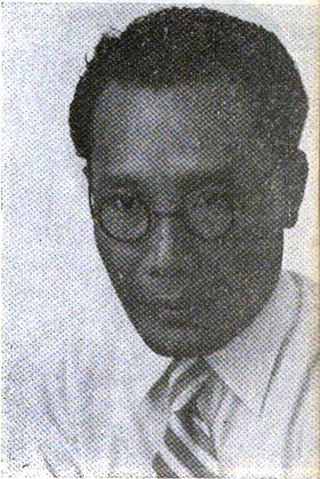
The State of Pasundan was a federal state (negara bagian) formed in the western part of the Indonesian island of Java by the Netherlands in 1948 following the Linggadjati Agreement. It was similar to the geographical area now encompassed by the current provinces of West Java, Banten and Jakarta.

Alexander Andries Maramis, more commonly known simply as A. A. Maramis, was an Indonesian politician and National Hero of Indonesia, who was involved in the struggle for independence. He was a member of the Investigating Committee for Preparatory Work for Independence (BPUPK), the organization which drafted the Constitution of Indonesia. In the early stages of the Indonesian government, following the Proclamation of Independence, he served as both Minister of Finance and Minister of Foreign Affairs. After the end of the Indonesian National Revolution, he served as the Indonesian ambassador to several nations, including the Philippines, West Germany, and the Soviet Union.

The People's Representative Council of the United States of Indonesia was one of the two national legislative assemblies in the United States of Indonesia (RUSI). The council was formed after the establishment of the Indonesian federal state. It consisted of 150 members.

The Provisional People's Representative Council was the first Indonesian legislature under the Provisional Constitution of 1950. The council was formed after the transition of Indonesia to a unitary state on 17 August 1950. The council initially consisted of 236 members, with 213 members remaining prior to the dissolution of the council in 1956.

Arudji Kartawinata was an Indonesian politician and military officer. During the Indonesian National Revolution, he was the first commander of the 3rd Division, predecessor to the modern Siliwangi Division. Politically, he was initially a member of Masyumi before later re-forming the Indonesian Islamic Union Party. He served as the chairman of the People's Representative Council for three years between 1963 and 1966.

The Senate of the United States of Indonesia was the upper chamber of the Parliament of the United States of Indonesia which, along with the People's Representative Council—the lower chamber — comprised the legislature of the United States of Indonesia.

Tadjuddin Noor was an Indonesian politician and nationalist. He was a deputy speaker of the Provisional People's Representative Council between 1950 and 1956, and chaired the legislature of the State of East Indonesia (NIT).

The First Djumhana Cabinet was the second cabinet established by the State of Pasundan. It was composed of nine ministers and one official. Its term of office ran from 10 to 31 January 1949.

Soemanang Soerjowinoto was an Indonesian journalist, politician, and banker.

Sarino Mangunpranoto was an Indonesian politician, teacher, and educator, who served as the 11th Minister of Education and Culture of Indonesia, from 1956 until 1957. A member of the Indonesian National Party (PNI), he also served as the Ambassador of Indonesia to Hungary, a member of the People's Representative Council from 1950 until 1956 and again from 1960 until 1962, as well as a member of the United States of Indonesia Senate, representing Central Java.

Hilman Djajadiningrat was an Indonesian aristocrat and politician.

Djumhana Wiriaatmadja was a Sundanese aristocrat, regent, politician, and diplomat.

The Ministry of Home Affairs was a government ministry of the State of Pasundan. The ministry was responsible for the control of the state apparatus, civil service, and the Pasundan Police Department.

Abdul Hakim Harahap was an Indonesian politician who held various positions, including deputy prime minister, in the 1950s.

Sadjarwo Djarwonagoro was a Javanese politician who served as the Minister of Agriculture, Minister of Agrarian Affairs, and member of the People's Representative Council and People's Consultative Assembly. He was also the rector of the Untag in Jakarta.

Antoinette Wailan Weënas, better known by her birth name Antoinette Wailan Waroh, was an Indonesian politician who became the only female parliament member in the Provisional Representative Body of East Indonesia.

The Governor of North Sumatra is the highest office in the province of North Sumatra. The governor of North Sumatra is an elected official who is responsible for leading the government in North Sumatra, proposing and enacting regional laws, and representing the North Sumatra province inside and outside the court. The governor alongside the deputy governor and 100 members of the Regional People's Representative Council are accountable for the strategic government of the province of North Sumatra.

Sahala Hamonangan Simatupang was an Indonesian politician and civil servant who became the Director General of Post and Telecommunications, Director General of the National Post and Telecommunication Company, Assistant Minister for Post, Giro, and Telecommunications Affairs, Deputy Minister of Post and Telecommunications, and Secretary General of the Department of Transportation.

Djerman Prawirawinata was a Sundanese politician who served as the last Minister of State of Pasundan and a member of the People's Representative Council.

Mohammad Enoch was an Indonesian politician and engineer. He briefly served as Minister of Public Works during the First Amir Sjarifuddin Cabinet prior to his resignation, and also briefly as mayor of Yogyakarta before that.


















